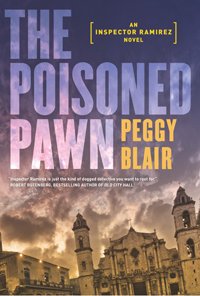
The Cuban detective Inspector Ramirez is such a lovely, warm-hearted character. He’s not at all moody, in love with his wife, devoted to his family and his coffee… oh, and he can see ghosts. It’s an ability he inherited from his grandmother who practiced Santeria – a Caribbean religion that fuses Catholicism with certain West African beliefs. He can communicate with the spirit of a murder victim until he resolves the mystery surrounding their death.
This second book in the series continues the story set out in the first. In fact, it is so closely linked to the previous one that it almost feels like the two were written at the same time, but separated into two volumes for the sake of keeping to standard novel length. The title refers to a chess move rather than a spate of seemingly random poisonings with links to Cuba (or prawns).
Mike Ellis, the cop who was found innocent of the murder of a Cuban boy in the first book heads back to his home in Canada. On arrival he discovers that his wife, with whom he had a rather spectacular quarrel which precipitated the entire story in the first volume, has died after collapsing into a coma on her flight back home on Christmas Day. His parents-in-law accuse him rather rabidly of causing her death. Although the accusations seem far-fetched, Mike is not quite as clean as the driven snow. Despite their loyalty to their colleague, the Canadian police start to suspect that he is somehow involved in his wife’s death. But then other people start dying in the same way back in Havana.
Meanwhile, the charismatic Ramirez is sent to Canada to arrange for the extradition of a Catholic bishop accused of child abuse and commerce in child pornography. Needless to say, Ramirez gets involved in both investigations. He gets help from his pathologist friend Apiro in Havana, lawyer Celia Jones who is a newcomer to the series, and the Ottawa-based indigenous police detective Charlie Pike. The characters are engaging and the observations of cultural differences are amusing, yet somehow this book feels less steeped in Cuban atmosphere than Midnight in Havana.
I also found the more immediate and personal crime story got a little lost in bigger picture. The historical facts upon which the rest of the story is based are well documented and moving, but perhaps explained in too much detail at times. The plight of the First Nations in Canada, the tearing apart of families and abuse of children in those notorious Catholic orphanages are all incontrovertible, but I am not sure that they mesh too well with the crime itself.
This is a book to be read in conjunction with the first book in the series. A third one is on its way and I hope that it will feature more of the strengths of the first: Ramirez on his home turf.
The Poisoned Pawn is released on 25 February in the UK. You can read our interview with the author here.
Pintail
Print
£9.55
CFL Rating: 3 Stars